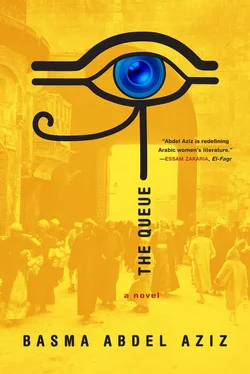He vividly remembered stopping the bleeding and performing a bit of first aid, and then being forced to close the wound, leaving the bullet where it was, next to Yehya’s bladder. An act like that would never have occurred to him; he was a surgeon with a solid understanding of his work and an awareness of its repercussions. But a younger colleague had informed him that he would need a special permit if he intended to extract the bullet. After a heated debate, the other doctor went to the filing cabinet, took out a stack of papers that had been placed carefully on the top shelf, and pulled out a light-yellow document. He threw it down in front of Tarek, fed up with his naïveté, and told him to read it before making a decision. Tarek picked up the document and was struggling to understand it when a high-pitched whistle shot through their confrontation.
An ambulance had arrived and the injured patients were meticulously divided into groups, Yehya Gad el-Rab Saeed among them. Their injuries were assessed, and then they were taken to the government-run Zephyr Hospital, which, according to announcements on the radio and TV, had gone above and beyond in its preparations for admitting the injured.
In his office now, Tarek left the file and folder on his desk and went to sit in the chair on the other side of the room, taking just the third document with him. This was the page that really bothered him, because every time he took it out of the file, began to read, and reached the end of the first paragraph, he remembered everything that had happened afterward. The morning after the Events, a doctor in military uniform appeared at the hospital and requested to meet him: him, Dr. Tarek Fahmy. The man refused to take a seat and turned down the cordial offers of tea or water while he was waiting. Tarek was summoned minutes later and tentatively approached to find a grave-looking doctor in his fifties pacing the lobby and pondering the imitation oil paintings hanging on the walls. Tarek invited him into his office and extended his hand, which the man shook coldly.
As soon as they shut the door behind them, the doctor produced the type of official ID that one didn’t dare question, inquired about Yehya’s X-ray, and then opened his briefcase and produced an order to confiscate it. Tarek asked if he would like some juice or something hot to drink, but the man firmly declined these, too. He stood up impatiently and asked Tarek for all existing copies of the X-ray. However, looking back, Tarek realized that the man hadn’t actually asked questions. He hadn’t phrased things in a way that left room for his request to be refused. The words that left his lips were direct orders, deftly coated with a sheen of courtesy but implying greater authority than any outpatient doctor possessed.
Tarek called the head nurse and told her to bring Yehya Gad el-Rab Saeed’s file at once. The moment she knocked, the doctor grasped the handle, wrenched the door open, and snatched the file from her. Tarek stood there, his empty hand outstretched in her direction, where it remained suspended in the air for several seconds. The doctor told her to leave and not to disturb them, and shut the door again. In a leisurely way, he took a seat in Tarek’s leather chair, engrossed in the X-ray and ignoring Tarek, who remained where he’d been standing in front of the door. The man took everything out of the file and then nodded, satisfied. He carefully removed the X-ray with a single word—“Excellent”—and then left the room.
Despite having suffered a nearly unbearable level of humiliation, Tarek kept silent until the man had left. Even if he’d been given a chance, he wouldn’t have dared to object or question the doctor — he knew full well that the visit had something to do with the Gate of the Northern Building. Tarek would have been a fool to think there wouldn’t be consequences if he crossed a man like that, especially in such difficult and uncertain times. A few hours later, he heard that the new X-ray machine in the basement had severely malfunctioned, and Sabah mentioned that she’d seen a Gate car with tinted windows take it away to be inspected and repaired. Yehya returned to the hospital two or three days later, utterly exhausted. The wound that Tarek had stitched up with his own hands was bleeding, and the man looked like he was about to pass out. Yehya introduced himself, though he didn’t need to, and asked if Tarek could help him start the hospital-admittance procedures. He wanted to proceed with treatment to have the bullet removed, he said, and had left Zephyr Hospital to come here because the doctors there couldn’t conduct the surgery he needed. After so many other injured people had arrived, they had told him his condition was relatively stable compared to the others, and had postponed the operation.
It made Tarek uneasy to remember how it hadn’t felt like the right time to tell Yehya about the official visit he’d received from the doctor who had been interested specifically in his case, despite all the other injured patients. He knew he wouldn’t be able to hide it forever; he knew Yehya would go looking for the X-ray when he came back, that one way or another he would discover it had been taken to Zephyr Hospital against his will, and that he wasn’t likely to see it again. The scene that followed flashed through his mind: the empty room to which he’d helped Yehya walk, the door he’d made sure to close so no one could eavesdrop, the cabinet from which he’d taken the yellow document, the same one that had stopped him from performing the operation when Yehya had first arrived, injured. He recalled how the papers felt as he flipped through them for the first time so they could read what it said together, and he remembered the look on Yehya’s face as he softly read aloud from the page in front of him:
Terms and Provisions Issued by the Gate on Conducting Work in Medical Facilities .
Article 4 (A): “Authorization for the Removal of Bullets.” The extraction of a bullet or any other type of firearm projectile, whether in a clinic or a private or government hospital, from a body of a person killed or injured, is a criminal act, except when performed under official authorization issued by the Gate of the Northern Building; parties excluded from the above are limited to Zephyr Hospital and its auxiliary buildings, which are direct subsidiaries of the Gate .
Sanctions Imposed on Those in Violation of Article 4 (A): Anyone who violates Article 4 (A), deliberately or inadvertently, shall be penalized as follows: First, s/he shall be banned from practicing their profession; and Second, s/he shall be imprisoned for a period to be determined by a judge. After the period of his/her punishment has ended, s/he shall not be allowed to return to the same position or occupation, except after s/he undergoes a rehabilitation program, the length of which shall be specially determined by the Gate of the Northern Building; and s/he shall be required to undergo a periodic performance review, at a minimum of once every month, or more frequently, as the situation requires .
There were a few lines written by hand in the margins, as if someone reading it had added a couple of points that might help the comprehension and implementation of the law. “To explain the article and its provisions — this measure has been taken in response to current critical circumstances; as a rule, bullets and projectiles may be the property of security units, and thus cannot be removed from the body without special authorization.”
Sitting in his leather chair now, Tarek smiled. He remembered feeling the tension lift when he’d first absorbed that passage and realized what fate he had narrowly escaped. He had come so close to being investigated and interrogated, and yet had unwittingly avoided it. Any shame he’d felt because of Yehya had vanished; he had clearly taken the right course of action. He had concealed his relief at the time, saying he was deeply sorry and advising Yehya to wait his turn at Zephyr Hospital, then had jumped up and handed him some strong antibiotics and a few boxes of painkillers. He had walked Yehya to the door, promising to perform the surgery if Zephyr Hospital was still too crowded, just as soon as Yehya brought him a permit from the Gate. Yehya should come see him anytime, he said, any day of the week, there was no need to make an appointment.
Читать дальше











